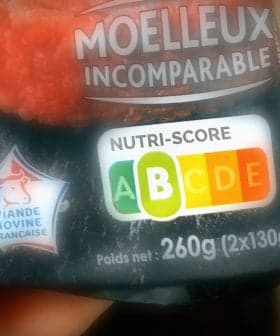Voluntary Adoption of Nutri-Score Approved in Romania
Romanian consumers will soon see Nutri-Score front-of-pack labels on food packages, following the government’s decision to adopt the system after years of uncertainty. Nutri-Score rates the healthiness of food products with a color and letter system based on fat, sugar, salt, and calorie content, and Romania joins other countries in requiring producers to apply the label to all products within a certain time frame.
By the end of the year, Romanian consumers will begin to notice a new front-of-pack label (FOPL) on food packages available for sale in the country.
The Romanian government announced the adoption of Nutri-Score after concluding a public consultation on the new rules for introducing the FOPL.
The decision brings an end to years of uncertainty about the country’s position on Nutri-Score adoption.
See Also:France Adopts Nutri-Score LabelsNutri-Score is a traffic-light-style food label that uses a combination of five coordinated colors and letters to rate the healthiness of a packaged food item based on its fat, sugar, salt, and calorie content per 100-gram or milliliter serving. A “Green A” indicates the healthiest option, while a “Red E” denotes the least healthy.
All Nutri-Score adopters in Romania will act voluntarily. Still, as in other countries adopting Nutri-Score, Romanian regulations require producers who choose to use Nutri-Score on one product to apply it to all products under the same brand within 24 to 36 months, depending on the number of products.
Romanian food producers and retailers will be required to follow the procedures and rules established by Santé Publique France (the French National Public Health Agency), including graphic standards and usage protocols.
Operators who fail to comply with the rules (e.g., providing incorrect nutritional data, misusing the logo) may have their rights revoked, face audits or be subject to sanctions or legal action.
The rules harmonize the use of Nutri-Score across all adopting countries. Alongside France and now Romania, the list includes Germany, Switzerland, Belgium, Luxembourg, the Netherlands, Spain and Portugal.
Recommended | Opposed |
|---|---|
France | Italy |
Begium | Greece |
Luxembourg | Czech Republic |
Netherlands | Latvia |
Germany | Cyprus |
Spain | Hungary |
Portugal | |
Switzerland | |
Romania | |
According to the international food product database Open Food Facts, which contributed to the design of the Nutri-Score label, the FOPL now appears in thousands of supermarkets and retail chains.
In countries where Nutri-Score has not been officially adopted — such as Slovenia, Austria, and Ukraine — some producers and retailers have voluntarily begun displaying it on part or all of their food packaging.
While the number of adopting countries continues to grow, Nutri-Score remains controversial in several parts of Europe.
Government and institutional officials in Italy, Greece, Cyprus, the Czech Republic, Hungary, and Latvia have repeatedly opposed Nutri-Score.
Despite significant differences in how their concerns are expressed, these countries share the belief that Nutri-Score parameters penalize local food specialties or products widely recognized as healthy when consumed in appropriate portions.
Olive oil has long been at the center of the heated European FOPL debate.
While the latest update to the Nutri-Score algorithm raised all grades of olive oil to a “Light-green B,” Nutri-Score founder Serge Hercberg has clarified that olive oil will never receive the highest rating due to its total fat content.
As a result of this debate, Spain has introduced Nutri-Score, and at the same time, it has exempted olive oil producers and distributors from labeling their packaging with the FOPL.
After Nutri-Score was updated, several large food producers began distancing themselves from the logo, starting with the French-based food corporation Danone. More recently, the Swiss giant Nestlé also announced its intention to drop the label from some products in Switzerland.
For a few years, Nutri-Score has been the front-runner of an expected decision by the European Commission on the introduction of a mandatory FOPL across the European Union. The process was stalled in Brussels as the issue was dropped as a legislative priority.
The new European Commission, which formed last autumn, showed no intention to pursue a harmonized FOPL.
The new Romanian decision will become effective 60 days after its publication in the country’s official gazette.









